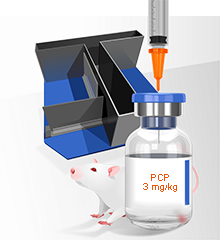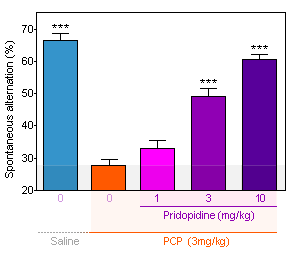Newsletter # 104

In vivo studies
Pridopidine (formerly Huntexil) is considered as a "Dopamine stabilizer" due to its D2 dopamine receptor (D2R) antagonism and was therefore developed initially for the treatment of motor symptoms in Huntington's disease1.
However, additional investigations reported a much higher affinity of pridopidine for sigma-1 receptor (Sig-1R) than for D2R.
Furthermore, in a human PET imaging study, Pridopidine selectively occupied a large fraction of Sig-1R in the brain, and not D2R2. The role of Sig-1R in the etiology and treatment of various psychiatric conditions, including Schizophrenia, has attracted much attention. Since Sig-1R has been shown to enhance the function of NMDA receptor (NMDAR), it is reasonable to imagine Sig-1R agonism as a potential therapeutic strategy for Schizophrenia3.
However, additional investigations reported a much higher affinity of pridopidine for sigma-1 receptor (Sig-1R) than for D2R.
Furthermore, in a human PET imaging study, Pridopidine selectively occupied a large fraction of Sig-1R in the brain, and not D2R2. The role of Sig-1R in the etiology and treatment of various psychiatric conditions, including Schizophrenia, has attracted much attention. Since Sig-1R has been shown to enhance the function of NMDA receptor (NMDAR), it is reasonable to imagine Sig-1R agonism as a potential therapeutic strategy for Schizophrenia3.
At Neurofit we found that in an NMDAR hypofunction animal model of Schizophrenia such as "Phencyclidine-induced cognitive deficit"4, Pridopidine dose-dependently restores the behavioral symptoms of mice. Thus, this finding further supports the potential of Sig-1R agonists as a treatment for NMDAR hypofunction disorders.
-

1 Phase 3 PROOF-HD trial - NCT04556656
2 https://doi.org/10.1007/s00259-020-05030-3
3 https://doi.org/10.1159/000376549
4 https://doi.org/10.3389/fnmol.2019.00185
-
Pridopidine treatment restores the cognitive ability of PCP-treated mice
The graph shows the cognitive performance of mice as measured by their spontaneous alternation in the T-maze. Due to the adverse psychological effects of PCP (memory and attention impairment, confusion and disorientation), a dramatic decrease in the spontaneous alternation of mice is observed (blue vs orange column).
The administration of Pridopidine increases in a dose-dependent manner the spontaneous alternation performance of PCP-mice, hence reflecting an improved cognitive ability (orange vs purple columns).
***, p ≤ 0.001 significantly different as compared
to PCP / Placebo group (n = 10 mice per group)
Get in touch


 PREVIOUS
PREVIOUS